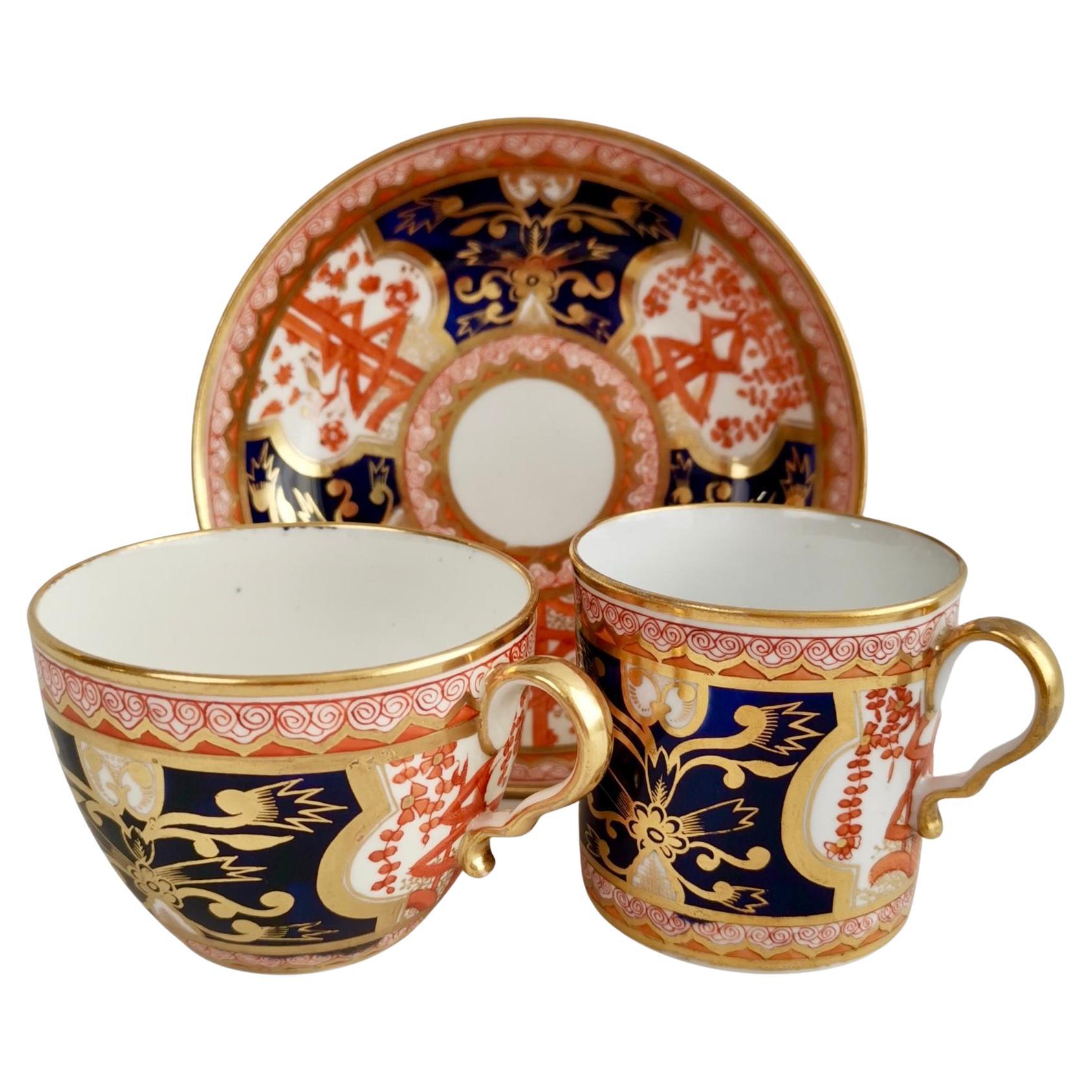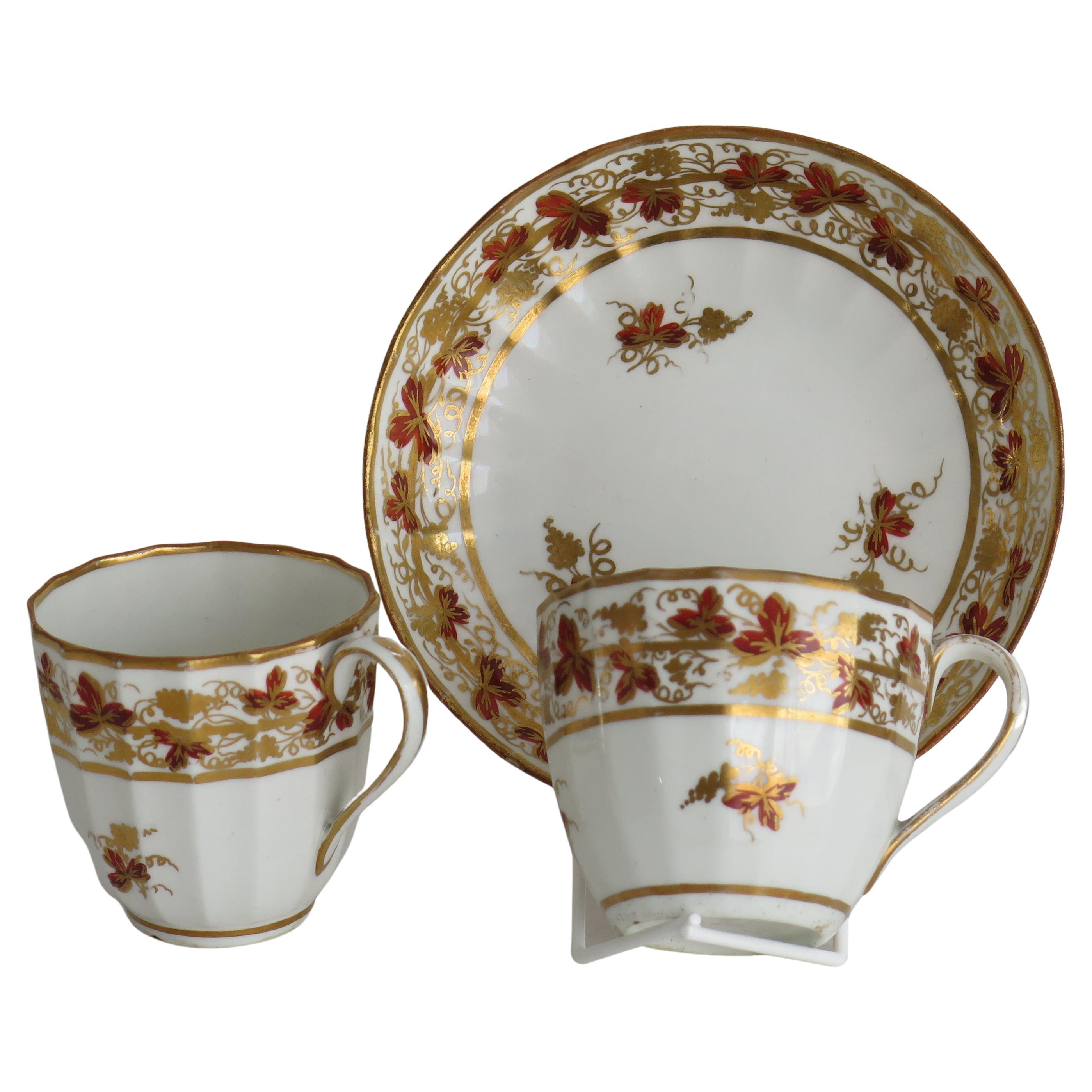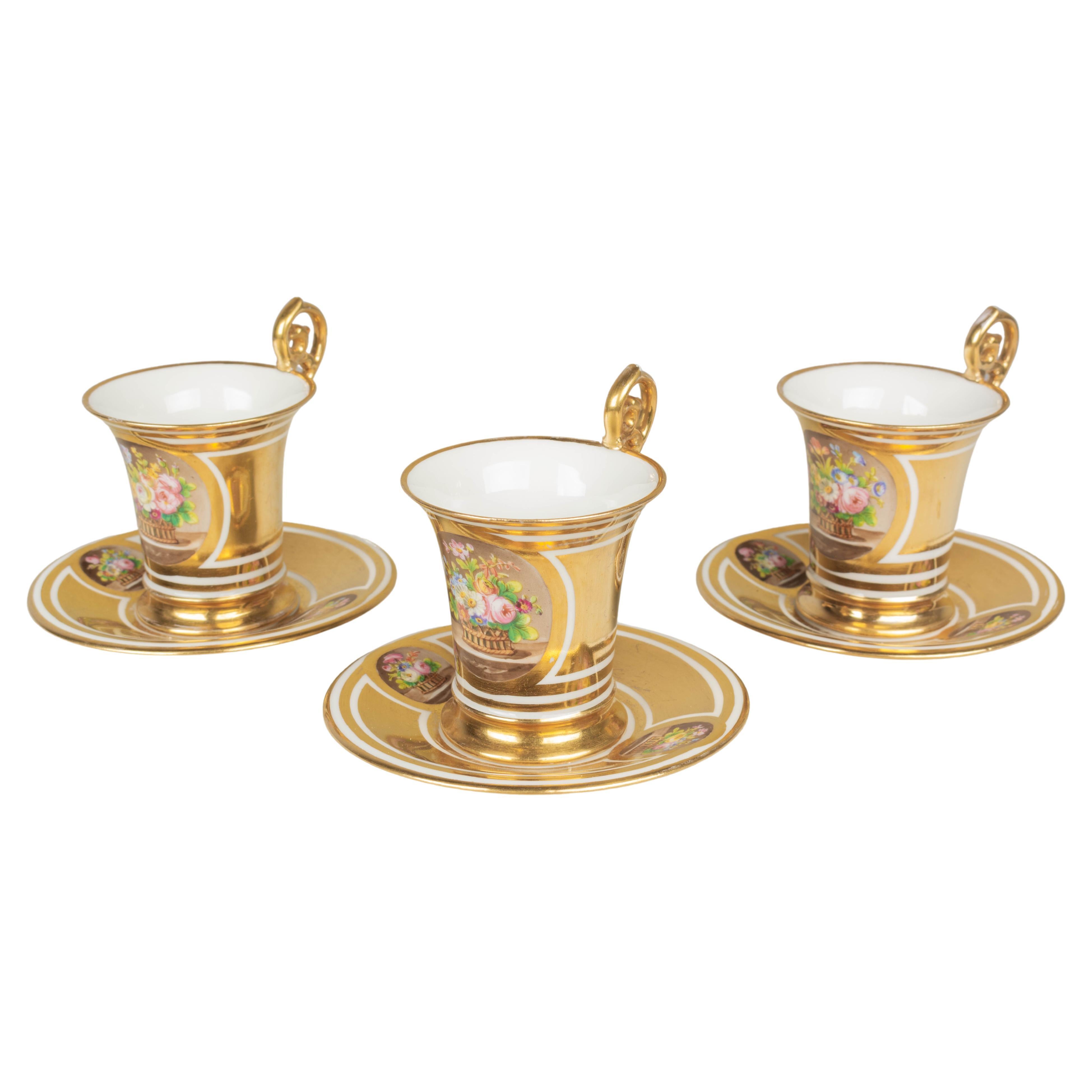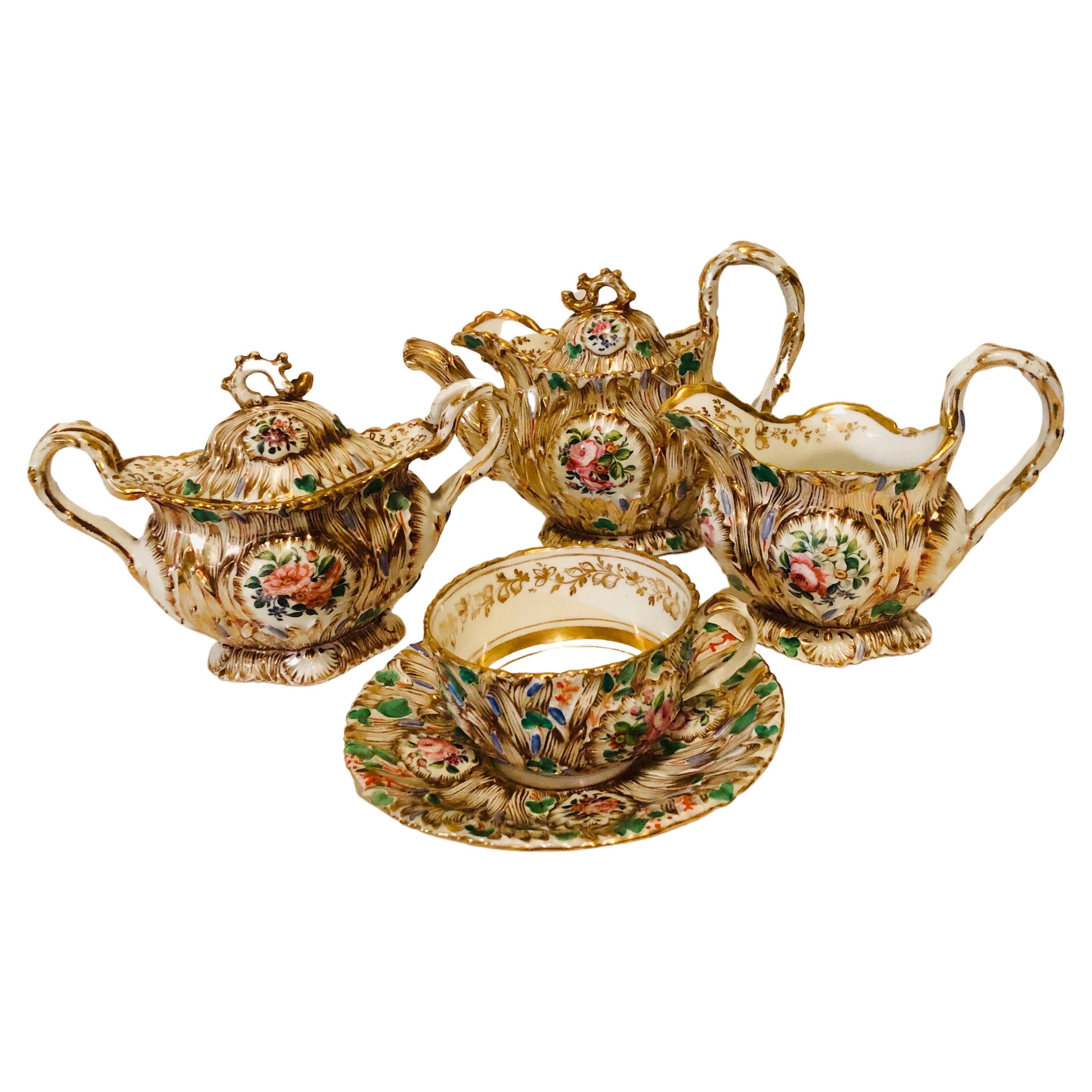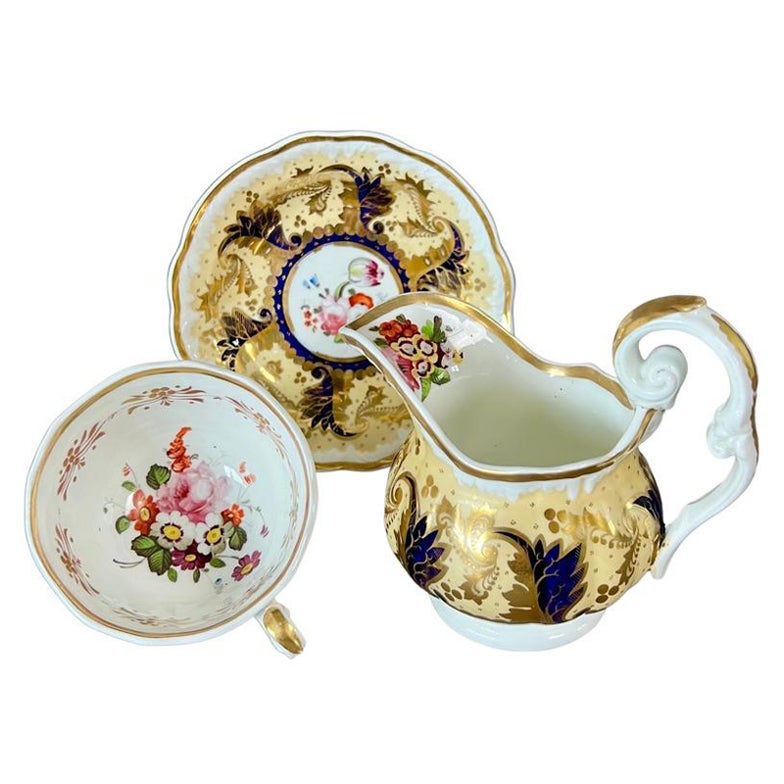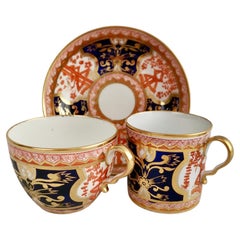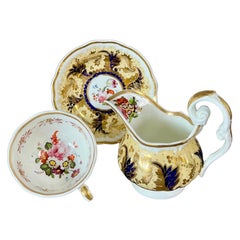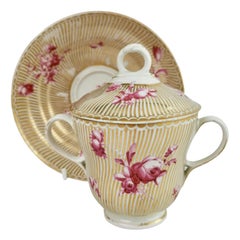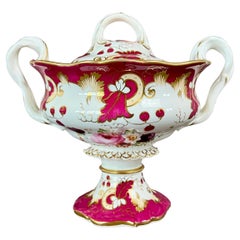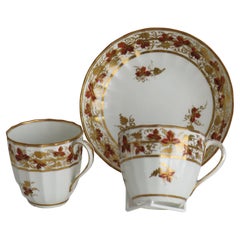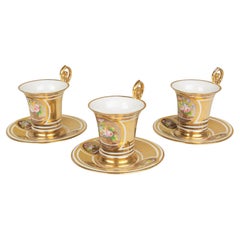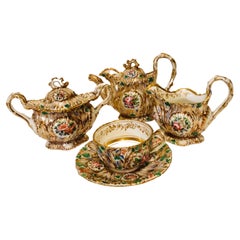Items Similar to Samuel Alcock Tearcup Trio, Maroon, Yellow, Gilt and Fine Landscapes, ca 1845
Want more images or videos?
Request additional images or videos from the seller
1 of 16
Samuel Alcock Tearcup Trio, Maroon, Yellow, Gilt and Fine Landscapes, ca 1845
$348per set
$435per set20% Off
£264.05per set
£330.07per set20% Off
€301.92per set
€377.40per set20% Off
CA$486.06per set
CA$607.58per set20% Off
A$540.43per set
A$675.54per set20% Off
CHF 282.19per set
CHF 352.73per set20% Off
MX$6,578.40per set
MX$8,223per set20% Off
NOK 3,600.56per set
NOK 4,500.70per set20% Off
SEK 3,373.55per set
SEK 4,216.94per set20% Off
DKK 2,253.30per set
DKK 2,816.63per set20% Off
Shipping
Retrieving quote...The 1stDibs Promise:
Authenticity Guarantee,
Money-Back Guarantee,
24-Hour Cancellation
About the Item
A true trio consisting of a teacup, a coffee cup and a saucer, “rustic bean” shape, in deep maroon and pale yellow ground, with gilt and finely painted landscape reserves
Pattern 9508
Year: ca 1845
Size: teacup 10.5cm (4.25”), coffee cup 9cm (3.5”), saucer 15.5cm (6”)
Condition: very good except one chip off the saucer and some very light wear
The Samuel Alcock factory was operative in Staffordshire between 1822 and 1856, after which it was bought by Sir James Duke and Nephews. The factory started as a partnership between the young Samuel Alcock and the older Ralph Stevenson, who provided the factory and capital. Alcock quickly took the factory to great heights, building one of the biggest factories of its time. Alcock jumped on the new Rococo Revival fashion and served a huge new middle class market. The reason we now don't hear much about Samuel Alcock porcelain is that much of it has been mis-identified over the years and attributed to Coalport, Ridgway, Rockingham or others; Alcock did not mark any of his porcelain save a few rare pieces, and the numbering system is difficult to understand. However, the wares are still wide spread and many are of great quality.
This item forms part of the Murray Pollinger Collection of Samuel Alcock Porcelain.
Murray Pollinger was a passionate collector of Samuel Alcock porcelain. He was known as a true gentleman, impeccably dressed, always kind and modest - even some of his porcelain collecting friends had no idea about the size and importance of his collection. From the mid 1980s until shortly before his death in 2022 he collected many thousands of pieces and painstakingly catalogued them. He also went on trips to Staffordshire to discover the history of Samuel Alcock from whatever little documentation has been preserved. Through his painstaking work, Pollinger was able to make sense of the pattern numbering system that was used, and this was a huge step forward in identifying and understanding the porcelain. A website with the results of his research will be made availabe over the course of 2023. While he sold off about half of his collection in 2016, the remaining half is now made available to a new generation of collectors.
Antique British porcelain is never perfect. Kilns were fired on coal in the 1800s, and this meant that china from that period can have some firing specks from flying particles. British makers were also known for their experimentation, and sometimes this resulted in technically imperfect results. Due to the shrinkage in the kiln, items can have small firing lines or develop crazing over time, which should not be seen as damage but as an imperfection of the maker's recipes, probably unknown at the time of making. Items have often been used for many years and can have normal signs of wear, and gilt can have signs of slight disintegration even if never handled. I will reflect any damage, repairs, obvious stress marks, crazing or heavy wear in the item description but some minor scratches, nicks, stains and gilt disintegration can be normal for vintage items and need to be taken into account.
There is widespread confusion on the internet about the difference between chips and nicks, or hairlines and cracks. I will reflect any damage as truthfully as I can, i.e. a nick is a tiny bit of damage smaller than 1mm and a chip is something you can easily see with the eye; a glazing line is a break in the glazing only; hairline is extremely tight and/or superficial and not picked up by the finger; and a crack is obvious both to the eye and the finger. Etcetera - I try to be as accurate as I can and please feel free to ask questions or request more detailed pictures!
- Creator:Samuel Alcock & Co. (Maker)
- Dimensions:Height: 1 in (2.54 cm)Width: 1 in (2.54 cm)Depth: 1 in (2.54 cm)
- Sold As:Set of 3
- Style:Rococo Revival (Of the Period)
- Materials and Techniques:
- Place of Origin:
- Period:
- Date of Manufacture:circa 1845
- Condition:Wear consistent with age and use. very good except one chip off the saucer and some very light wear.
- Seller Location:London, GB
- Reference Number:Seller: MP-ALC921stDibs: LU4805143935422
About the Seller
5.0
Gold Seller
Premium sellers maintaining a 4.3+ rating and 24-hour response times
Established in 2016
1stDibs seller since 2019
226 sales on 1stDibs
- ShippingRetrieving quote...Shipping from: London, United Kingdom
- Return Policy
Authenticity Guarantee
In the unlikely event there’s an issue with an item’s authenticity, contact us within 1 year for a full refund. DetailsMoney-Back Guarantee
If your item is not as described, is damaged in transit, or does not arrive, contact us within 7 days for a full refund. Details24-Hour Cancellation
You have a 24-hour grace period in which to reconsider your purchase, with no questions asked.Vetted Professional Sellers
Our world-class sellers must adhere to strict standards for service and quality, maintaining the integrity of our listings.Price-Match Guarantee
If you find that a seller listed the same item for a lower price elsewhere, we’ll match it.Trusted Global Delivery
Our best-in-class carrier network provides specialized shipping options worldwide, including custom delivery.More From This Seller
View AllSpode Porcelain Teacup Trio, Red Imari Dollar Pattern, Regency, ca 1810
By Spode
Located in London, GB
This is a beautiful orphaned teacup made by Spode in about 1810. It bears a lavish Japanese-inspired Imari pattern.
Spode was the great pioneer among the Georgian potters in England. Around the year 1800 he perfected the bone china recipe that has been used by British potters ever since, and he was also the leading potter behind the technique of transferware, making it possible for English potters to replace the Chinese export china, which had come to an end around that time, with their own designs. This was fundamental to a thriving industry that would last for about 150 years and provide half the world with their tableware. Spode porcelain is regarded as one of the highest quality porcelains around; for a soft-paste porcelain it is surprisingly hard and fine, and has a wonderful bright white colour.
The pattern on this can is called "Dollar" pattern, a very famous pattern that was used by English potters in the 18th and early 19th Century. It is obvious why it is called “dollar” - but its origin is less obvious! It is thought that this pattern was derived from a very old Chinese pattern depicting a tree with elaborate foliage that hides a Chinese character representing longevity or happiness. Traditionally, this went with a an image called “Taotie”, which was used on very ancient bronze vases...
Category
Antique Early 1800s English Regency Porcelain
Materials
Porcelain
$420 Sale Price / set
20% Off
Free Shipping
Samuel Alcock Teacup and Milk Jug, Pale Yellow, Gilt and Flowers, ca 1824
By Samuel Alcock & Co.
Located in London, GB
A teacup and saucer with milk jug in the “melted snow” shape with double drop handles, pale yellow ground with rich gilt and cobalt blue acanthus pattern and finely painted flower re...
Category
Antique 1820s English Regency Tea Sets
Materials
Porcelain
$496 Sale Price / set
20% Off
Free Shipping
Chelsea-Derby Chocolate Cup Set, Gilt Stripes, Puce Flowers, Rococo 1770-1775
By Chelsea Porcelain, Derby, Chelsea-Derby
Located in London, GB
This is a beautiful chocolate cup set made by Chelsea-Derby between 1770 and 1775, which was the Rococo era. The set consists of a cup, a saucer and a cover, and is decorated in a st...
Category
Antique 1770s English Rococo Tea Sets
Materials
Porcelain
$940 Sale Price / set
23% Off
Free Shipping
Samuel Alcock Footed Porcelain Sauce Tureen, Maroon with Flower Sprays, ca 1842
By Samuel Alcock & Co.
Located in London, GB
A footed two-handled sauce tureen with cover, maroon and pale yellow ground with beautiful hand painted flower sprays on lower part of body; twisted handles and a petticoat stem
Pat...
Category
Antique 1840s English Rococo Revival Serving Bowls
Materials
Porcelain
$600 Sale Price / set
20% Off
Free Shipping
Samuel Alcock Porcelain Solitaire Tea Set, Cobalt Blue, Gilt, Landscapes, ca1825
By Samuel Alcock & Co.
Located in London, GB
A solitaire tea set consisting of a teapot with cover on a stand and a trio consisting of a teacup, a coffee cup and a saucer, in “half orange” shape with deep cobalt blue and yellow...
Category
Antique 1820s English Regency Tea Sets
Materials
Porcelain
$1,012 Sale Price / set
20% Off
Free Shipping
Derby Coffee Cup, Monochrome Sepia Landscapes Zachariah Boreman, ca 1785
By Crown Derby, Derby
Located in London, GB
This is a very rare and stunning coffee cup and saucer made by Derby in about 1785. The set has a white ground with graceful gilding, and two stunning little landscapes painted by Za...
Category
Antique 1780s English Romantic Tea Sets
Materials
Porcelain
$1,912 Sale Price / set
20% Off
Free Shipping
You May Also Like
Georgian Derby Trio Tea & Coffee Cup & Saucer Pattern 569, Puce Mark Circa 1795
By Derby
Located in Lincoln, Lincolnshire
This is a good porcelain TRIO of a Tea Cup, Coffee Cup and saucer by the Derby factory, made during the George 111rd period, circa 1795.
The pieces are well potted in the Hamilton...
Category
Antique Late 18th Century British George III Porcelain
Materials
Porcelain
19th Century French Sèvres Gilt Porcelain Cup & Saucer, Set of 3
By Manufacture Nationale de Sèvres
Located in Winter Park, FL
A set of three 19th Century French Sèvres fine gilded porcelain cups and saucers with tall scrolled handles. Hand-painted floral decoration. Sèvres mark to underside with red Château...
Category
Antique 19th Century French Beaux Arts Porcelain
Materials
Porcelain
English Porcelain Cups & Saucers Set of Three Antique Rare Imari Colors Ca. 1805
By Chamberlains Worcester
Located in Katonah, NY
This gorgeous set of three antique English porcelain coffee cups with matching saucers was hand-painted by Chamberlains Worcester circa 1805.
It is a beautiful example of George III ...
Category
Antique Early 19th Century English Regency Tea Sets
Materials
Porcelain
Jacob Petit Paris Porcelain Tea Set with Gilt and Colorful Rococo Decoration
By Jacob Petit
Located in Boston, MA
This is a fabulous Jacob Petit Old Paris Porcelain solitaire museum quality tea set. It is profusely decorated with gold, cartouches of flowers and many colors in the rococo style, w...
Category
Antique 1840s French Rococo Tea Sets
Materials
Porcelain
Early 19th century Coalport John Rose period cabinet trio, circa 1811-20
Located in Central England, GB
This fine set consists of a saucer, teacup and coffee cup. All pieces are richly hand painted with a dark royal blue ground. Three panels on each piece are beautifully hand painted w...
Category
Antique 19th Century English George III Ceramics
Materials
Porcelain
18th C Worcester Porcelain Trio of Coffee Cup Tea Bowl and Saucer, circa 1780
By Royal Worcester
Located in Lincoln, Lincolnshire
This is a good late 18th century Worcester porcelain TRIO of Coffee Cup, Tea Bowl and Saucer in a combined blue and gold pattern, full...
Category
Antique 18th Century British George III Decorative Bowls
Materials
Porcelain
More Ways To Browse
Stained Glass Dress
Antique Tea Dress
Antique Teacups And Saucers
Antique Tea Cup Collection
Silver Rococo Tea Set
British Tea Cups
Alcock Porcelain
Coalport Cup
Coalport Yellow
Staffordshire Tea Cups
Coalport Cup And Saucer
Antique Coalport Cups And Saucers
Ridgway Tea Set
Coalport Teacup
18th Century Chinese Tea Cup
Hall Teapot
Silver Teapot Danish
Sugar Jar
